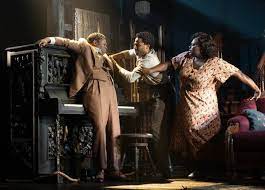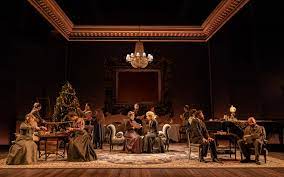FRIGID Fringe Festival 2023 (Part 4)
The 17th Annual FRIGID Fringe Festival is underway in New York City. This three week event is an open and uncensored downtown theater festival that gives artists an opportunity to let their ingenuity thrive in a venue that values freedom of expression and artistic determination. Many of this year’s performances are livestreamed so there are ample opportunities to see some Indie theater works and support the artists who develop and perform them.

As I Eat the World
“Everything makes me angry” admits Luis Roberto Herrera. As I Eat the World is his highly charged story about eating disorders and mental health issues he has and is confronting. On the stage is a cake shaped like Earth. “I’m here to eat the world” like “a big ‘ol tasty ass cake”. And he takes a bite noting “some good ass icing”.
The moments of levity don’t hang around too long as Mr. Herrera gets to the proverbial meat of the matter. He was “a chubby little Hispanic boy”. Soda was water. When he was in sixth grade, he wore “whatever my french fry body was comfortable with”. The recollections are gritty and candid.
Latinx culture is identified as a major cause for his condition. Food is an absolute necessity at family parties. His discomfort with himself was fueled by uncles who took one look and laughed at him “like a pack of hyenas”. The uber masculine culture resulted in his changing clothing to become basic and not stand out.
More insightfulness is garnered by observing the type of boys who girls talked with. These compounding inputs resulted in decision to “starve myself”. By the time he is a senior in college (2013) he has been starving himself on and off since the seventh grade. The material is rough and relentless.
During a period living in Florida “all I want to do is bang my head against a wall till I paint it red”. The questions he asks aloud following that outburst is the highlight of this piece. We are allowed inside a myriad of Why Why Why self-lacerations. That someone can be that angry yet channel it into a autobiographical one person show is commendable.
A few more anecdotes would be welcome as his personal observations are poignant. The recited food list was one example of a lull in the storytelling. At the end of the play Mr. Herrera doesn’t evoke a rainbow. He exhales. He has shared his cake with us and perhaps that, in and of itself, is enough.

How to Be an Ethical Slut
Brooke McCarthy inhabits the cabaret entertainer Blake Valentini and her unabated promiscuity in the bluntly and aptly titled How to Be an Ethical Slut. She opens with “Hey New York, are you ready to get slutty?” Then she sings a song about loving her ass.
Trollop could have replaced the word slut to perhaps add a level of dignity to this sex mentoring sideshow. But subtlety is not on the song list. The show is broken down into parts, all of which involve bragging about various partners. One part reflects on how to be a dumb slut. Another focuses on how to be a slut in love. This structure works for the material and the quantity of sexual escapades recounted.
As would be expected there is humor in this tale of growing up to be a “smarter slut”. The typical bases are covered including STDs, threelationships, swinger’s clubs and married men. These individual stories are punctuated by (occasionally reworded) song breaks which sometimes feel forced into the act and come across a little shrill and bombastic.
If you are debating whether to take these particular lessons, you should know that “once you become an ethical slut there’s no going back”. The whimsy is certainly fun but the show needs more of it between the sheets. Our chanteuse concludes “I’m really proud to be an ethical slut” before belting out the La Cage aux Folles anthem “I Am What I Am”. After watching this aggressively in your face sexmusical, you might walk away thinking “sometimes the aces, sometimes the deuces”. In this case, however, you need to at least consider working “thruple” into that lyric.
Performances at the Frigid Fringe Festival are running through March 5, 2023. Two dozen shows are performed multiple times at either the Kraine Theater or UNDER St Mark’s. Tickets can also be purchased for many shows via livestreaming as well.











You must be logged in to post a comment.